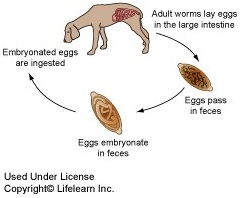
What are whipworms?
Whipworms are intestinal parasites that are about 1/4 inch (6 mm) long. They live in the cecum and colon (large intestine) of dogs where they cause severe irritation to the lining of those organs. Whipworm infection results in watery, bloody diarrhea, weight loss, and general debilitation. They are one of the most pathogenic worms found in dogs.

How do dogs get whipworms?
Whipworms pass microscopic eggs in the stool. The eggs are very resistant to drying and heat, so they can remain viable (alive) in the environment for up to 5 years. Once laid, they embryonate (mature to an infective stage) in the environment and are able to re-infect the dog in 10-60 days. The embryonated eggs are swallowed and hatch and mature to adults in the lower intestinal tract, completing their life cycle (see illustration).
How are whipworms diagnosed?
Whipworms are diagnosed by finding eggs with a microscopic examination of the stool. However, multiple stool samples are often required because these parasites pass small numbers of eggs on an irregular basis, so some samples may be falsely negative. In addition, it takes approximately 11-12 weeks after hatching for a female adult to begin to lay eggs. Any dog with chronic large bowel diarrhea should be suspected to have whipworms, even if the stool sample was negative. Thus, it is an accepted practice to treat chronic diarrhea by administering a whipworm dewormer. Response to treatment is an indication that whipworms were present but could not be detected on fecal examination.

How are whipworms treated?
There are several drugs that are very effective against whipworms. At least two treatments are needed, spaced at a three to four week interval. The most frustrating aspect of whipworm infections is the high rate of re-infection because the eggs are extremely hardy in the environment. Therefore, if a dog is diagnosed with a whipworm infection, it is advisable to treat again every three to four months. The other option, which is much simpler, is to use a heartworm preventative that contains a whipworm medication. Whipworms are not nearly as common today because of widespread use of these modern heartworm prevention products.
Can I get whipworms from my dog?
No. Whipworms are not infectious to people. They are exclusive parasites of the dog.
This client information sheet is based on material written by: Ernest Ward, DVM © Copyright 2009 Lifelearn Inc. Used and/or modified with permission under license.







